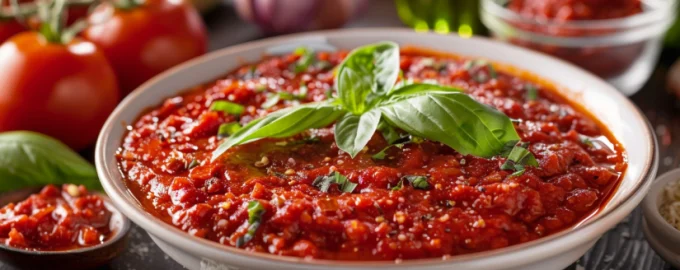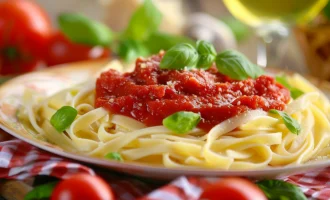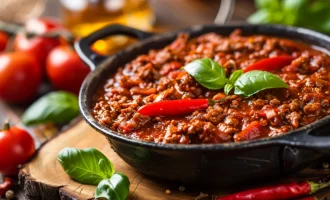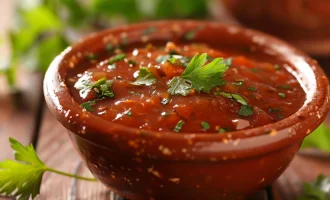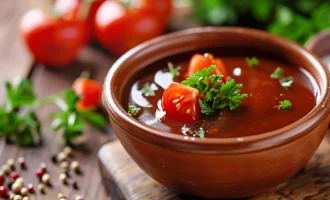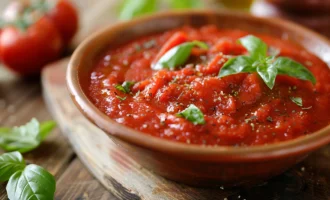Marinara sauce is a quintessential element of Italian cuisine, with a history that dates back to the 16th century after tomatoes were introduced to Europe from the Americas. The term “marinara” is derived from “marinaro,” meaning “sailor.” Legend suggests that the sauce was a staple for Italian sailors on long sea voyages because it could be cooked quickly and would not spoil easily. This tomato-based sauce is renowned for its simplicity and versatility, serving as a fundamental base for many Italian dishes such as pasta, pizza, and seafood.
- Ripe tomatoes (fresh and peeled or canned) 800 g
- Olive oil 60 ml
- Garlic 4 cloves
- Onion 100 g
- Dried oregano 1 teaspoon
- Fresh basil leaves 15 g
- Salt to taste
- Sugar 1 teaspoon
- Red pepper flakes 1\2 teaspoon
- If using fresh tomatoes, blanch them in boiling water for a minute, then cool in ice water. Peel the skins and crush the tomatoes by hand. For canned tomatoes, simply crush them.
- In a large saucepan, heat the olive oil over medium heat. Add the minced garlic and chopped onion, sautéing until the onion is translucent and the garlic is fragrant, about 2-3 minutes.
- Add the crushed tomatoes to the saucepan. Stir in the dried oregano, red pepper flakes (if using), salt, and sugar.
- Bring the sauce to a simmer, then reduce the heat to low. Let it cook, uncovered, stirring occasionally, for about 25-30 minutes, or until the sauce has thickened to your liking.
- A few minutes before the sauce is done, stir in the fresh basil leaves. Adjust the seasoning with more salt or sugar if needed.
- Use the sauce immediately with your favorite pasta, as a base for pizza, or alongside seafood dishes.
Storage Tips
Marinara sauce can be stored in an airtight container in the refrigerator for up to 5 days. For longer storage, the sauce can be frozen for up to 3 months. Thaw overnight in the refrigerator before reheating gently over low heat.
Useful Properties of the Main Ingredient
Tomatoes, the star of marinara sauce, are a significant source of vitamins C and K, potassium, folate, and antioxidants, including lycopene. Lycopene has been linked to numerous health benefits, including reduced risk of heart disease and cancer. Tomatoes also provide dietary fiber, which supports digestive health.
Interesting Facts
- Sailor’s Sauce: The name “marinara” reflects its historical association with sailors. The high acidity of tomatoes made the sauce a durable food option for long sea journeys.
- Global Staple: While marinara sauce has its roots in Italian cuisine, it has become a staple sauce worldwide, appreciated for its straightforward preparation and depth of flavor.
- Versatility in Cooking: Beyond its traditional uses, marinara sauce serves as a base for many other Italian sauces, such as arrabbiata and puttanesca, showcasing its versatility in the culinary world.

